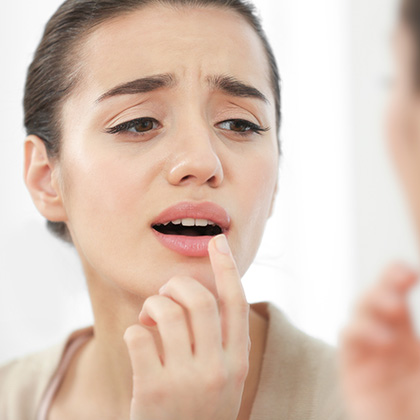
It may not exactly be a word that rolls off the tongue, but inositol is so widespread in nature it’s literally all around us (inside and out).
What is inositol?
Inositol is a water-soluble chemical compound or molecule that’s a type of sugar, inositol isn’t a single compound but nine similar compounds, all with different names. So, most of the time when you hear someone talk about inositol, what they’re really referring to is myo-inositol, which is the most bioavailable type (that is, the type of inositol that’s best absorbed by the body) and the most abundant type.
Myo-inositol was first recognised in 1850 by a scientist called Johann Joseph Scherer. Since then, experts have discovered myo-inositol throughout the human body, with particularly high amounts in muscle and brain tissues as well as the prostate gland and seminal fluid in men (seminal fluid, for instance, is one of the richest sources of myo-inositol with almost three times the amount found in blood) (i).
Because we produce our own myo-inositol it isn’t considered an essential nutrient (nutrients are classed as essential if they’re necessary for body functions and you can only get them through your diet). It isn’t just found in humans and other animals either. Myo-inositol is also present in a wide range of plants and other foods including fruits, vegetables and grains, so you can top up your levels by adjusting your diet (read on to find out more about which foods contain myo-inositol).
Is inositol a vitamin?
Myo-inositol belongs to the family of B vitamins, which may explain why it used to be (and still sometimes is) called vitamin B8. But confusingly, it isn’t actually a vitamin at all; rather it’s called a vitamin-like substance (or pseudovitamin).
What does inositol do to your body?
Myo-inositol has several important roles in the body. Most importantly it’s needed for:
-
The development and functioning of your peripheral nerves (the nerves outside your brain and spinal cord)
-
Cell structure, growth and survival
-
The formation and development of your bones
-
Reproduction and fertility
-
The break-down of carbohydrates in your body (glucose metabolism)
-
Control of certain hormones including insulin, thyroid-stimulating hormone and follicle stimulating hormone (it’s also thought to affect brain chemicals, or neurotransmitters, such as serotonin and dopamine)
How much inositol do we need?
Despite the fact that scientists have known about myo-inositol for some time we still don’t really know how much we need in our diets every day to stay healthy, so there’s no official recommended daily amount. But many studies have looked at the benefits of taking myo-inositol supplements, with results suggesting they could be helpful if you have certain health conditions.
Inositol for PCOS (polycystic ovary syndrome)
Women living with PCOS – a condition that causes symptoms such as irregular periods, weight gain, acne, excess facial hair and difficulties getting pregnant – often also experience a problem called insulin resistance. This is when your body doesn’t respond normally to the hormone insulin and becomes resistant to the effect of normal insulin levels. One study suggests that taking myo-inositol supplements could be helpful to women with insulin resistance as a result of PCOS (ii).
Experts have also found myo-inositol to be helpful when it comes to other PCOS symptoms. These include reducing androgen levels, improving ovarian function and fertility, and controlling reproduction and ovulation hormones (iii).
You can read more about this in our article What Are the Benefits of Myo-Inositol in Supporting PCOS Symptoms, as well as more on PCOS in general visiting our PCOS hub.
Inositol and mental health
ce myo-inositol helps regulate the balance of mood-influencing neurotransmitters like serotonin and dopamine, could it help with mental health issues? Well, there is evidence to suggest it could. Some time ago, for instance, researchers discovered people with depression, anxiety and bipolar disorders had low levels of myo-inositol in their brains (iv). There’s also a study that suggests inositol supplements might have an antidepressant effect (v) – though unfortunately few other trials have reached the same conclusion.
There’s stronger evidence that myo-inositol could be helpful to those with panic disorder, with scientists saying people taking myo-inositol supplements could be useful in managing their symptoms (vi). Similarly, people with bipolar disorder might also find a myo-inositol supplement helpful (vii).
Inositol for metabolic syndrome
Metabolic syndrome is the name for a group of conditions and risk factors that hike your risk of developing cardiovascular disease and type 2 diabetes. But researchers think taking myo-inositol may help because of the way it regulates your blood sugar (viii). The same scientists also claim myo-inositol could be helpful for people with insulin resistance, type 1 and type 2 diabetes, PCOS as well as pregnant women who have or are at risk of developing gestational diabetes.
Inositol for weight loss
There is some evidence inositol may help with weight loss, particularly in women with PCOS. One small-scale study, for instance, found women with PCOS taking myo-inositol lost a significant amount of weight, whereas those who received a placebo actually gained a little weight during the 14-week trial period (ix). Meanwhile a review of 15 clinical trials also suggests taking myo-inositol supplements may help reduce body mass index (BMI) scores in people who are overweight or obese as well as in women with PCOS (x).
Inositol supplements
Myo-inositol is available as a single supplement – often in powder form – but you can also get it in combination supplements as well as in lecithin supplements (including lecithin granules). If you’re healthy you can simply top-up your inositol levels by taking a multivitamin or B complex. But if you want to try myo-inositol for one of the conditions listed above it’s likely you’ll need a more substantial dose which, going by many of the studies that have been published on the subject, is around 4g a day for powdered supplements (approximately one level teaspoon) (i). Always check with your doctor before taking myo-inositol or any other supplement for a medical condition.
Inositol side-effects
Myo-inositol supplements are considered very safe and well tolerated by most of us, and there’s a growing amount of evidence to suggest they’re effective too. Just be careful not to take a really high dose – 12g a day or more – which could cause mild side effects such as nausea, wind, headaches, dizziness, sleeping difficulties and tiredness.
What foods are high in inositol?
Back in 1980 the American Journal of Clinical Nutrition published a guide to the amounts of myo-inositol found in 487 common foods, and that guide is still widely used today (xi). Here’s a quick selection of foods that contain some of the highest amounts of myo-inositol in various different food categories:
Fruit: cantaloupe melon, oranges and orange juice, grapefruit and grapefruit juice, lime, blackberries, kiwi fruit, nectarines, mangos, prunes, cherries
Vegetables: onions, artichokes, okra, aubergines, Brussel sprouts, cabbage, squash, green peppers, French beans, tomatoes, tomato juice
Beans: red kidney beans, peas, lima beans, black-eyed peas,
Grains: bran flakes, oats, wheat, corn, barley
Nuts: smooth peanut butter, almonds, peanuts, walnuts, cashews
Dairy foods: yoghurt, skimmed milk, whole milk
Meat and fish: liver, corned beef, oysters
Eating a healthy balanced diet that includes a wide variety of different foods (and not skimping on fruit and veg) can help make sure you’re getting a good intake of myo-inositol. But in some circumstances, you may also want to consider taking a supplement.
Find out more
To learn more about health and wellness, visit our Blog, or speak to one of our experts to recieve free nutrition advice.
References:
-
Available online: https://www.inositoli.it/en/myo-inositol/
-
Giordano D. et al., Effects of Myo-Inositol Supplementation in Postmenopausal Women with Metabolic Syndrome: A Perspective, Randomized, Placebo-Controlled Study. Menopause. 2011 Jan;18(1):102-4. Available online: https://journals.lww.com/menopausejournal/Abstract/2011/01000/Effects_of_myo_inositol_supplementation_in.20.aspx
-
Zdravko . K, Gateva. A. Inositols in PCOS. Molecules. 2020 Dec;25(23):5566.Available online: https://www.ncbi.nlm.nih.gov/pmc/articles/PMC7729761/
-
Barkai AI. et al., Reduced myo-inositol levels in cerebrospinal fluid from patients with affective disorder. Biol Psychiatry. 1978 Feb ;13(1):65-72. Available online: https://pubmed.ncbi.nlm.nih.gov/623854/
Shimon H. et al., Reduced frontal cortex inositol levels in postmortem brain of suicide victims and patients with bipolar disorder. Am J Psychiatry. 1997 Aug ;154(8):1148-50. Available online: https://ajp.psychiatryonline.org/doi/abs/10.1176/ajp.154.8.1148 -
Levine J. et al., Double-blind, controlled trial of inositol treatment of depression. Am J Psychiatry. 1995 May ;152(5):792-4. Available online: https://ajp.psychiatryonline.org/doi/abs/10.1176/ajp.152.5.792
-
Zulfarina MS. et al., Pharmacological Therapy in Panic Disorder: Current Guidelines and Novel Drugs Discovery for Treatment-resistant Patient. Clin Psychopharmacol Neurosci. 2019 Mar ;17(2): 145–154. Available online: https://www.ncbi.nlm.nih.gov/pmc/articles/PMC6478076/
Benjamin J. et al., Double-blind, placebo-controlled, crossover trial of inositol treatment for panic disorder. Am J Psychiatry. 1995 Jul ;152(7):1084-6. Available online: https://ajp.psychiatryonline.org/doi/abs/10.1176/ajp.152.7.1084 -
Chengappa KN. et al., Inositol as an add-on treatment for bipolar depression. Bipolar Disord. 2000 Mar ;2(1):47-55. Available online: https://onlinelibrary.wiley.com/doi/abs/10.1034/j.1399-5618.2000.020107.x
-
DiNicolantonion. JJ., O’Keefe JH., Myo-inositol for insulin resistance, metabolic syndrome, polycystic ovary syndrome and gestational diabetes. Open Heart. 2022;9(1): e001989. Available online: https://www.ncbi.nlm.nih.gov/pmc/articles/PMC8896029/
-
Gerli S. et al., Randomized, double blind placebo-controlled trial: effects of myo-inositol on ovarian function and metabolic factors in women with PCOS. Eur Rev Med Pharmacol Sci. 2007 Sep-Oct;11(5):347-54. Available online: https://pubmed.ncbi.nlm.nih.gov/18074942/
-
Zarezadeh M. et al., Inositol supplementation and body mass index: A systematic review and meta-analysis of randomized clinical trials. Obes Sci Pract. 2021 Oct 22;8(3):387-397. Available online: https://onlinelibrary.wiley.com/doi/10.1002/osp4.569
-
Clements. RS Jr., Darnell B., Myo-inositol content of common foods: development of a high-myo-inositol diet. Am J Clin Nutr. 1980 Sep ;33(9):1954-67. Available online: https://academic.oup.com/ajcn/article-abstract/33/9/1954/4812548?redirectedFrom=fulltext&login=false
Related Posts
Disclaimer: The information presented by Nature's Best is for informational purposes only. It is based on scientific studies (human, animal, or in vitro), clinical experience, or traditional usage as cited in each article. The results reported may not necessarily occur in all individuals. Self-treatment is not recommended for life-threatening conditions that require medical treatment under a doctor's care. For many of the conditions discussed, treatment with prescription or over the counter medication is also available. Consult your doctor, practitioner, and/or pharmacist for any health problem and before using any supplements or before making any changes in prescribed medications.

Christine
Christine Morgan has been a freelance health and wellbeing journalist for almost 20 years, having written for numerous publications including the Daily Mirror, S Magazine, Top Sante, Healthy, Woman & Home, Zest, Allergy, Healthy Times and Pregnancy & Birth; she has also edited several titles such as Women’ Health, Shine’s Real Health & Beauty and All About Health.
View More



